Faith, in the first half of Buffy the Vampire Slayer S3, makes a strong impression without actually garnering much screen time. As an audience, we come to understand exactly who she is and how she differs from Buffy. We see her troubling, deep-seated instability, but it’s easy to dismiss or excuse it. She lost her mother, and her first Watcher, after all, and then there was the whole Gwendolyn Post fiasco.
So, yes, trust issues. Fair enough. She’s never going to be as together as the actual heroine of the show, right? A second banana has to suffer by contrast.
Thus Faith is often in the background, or absent altogether, as the Scoobies’ romantic woes and even their college aspirations take center stage in the first dozen or so episodes of the kids’ senior year.
All that ends with “Bad Girls,” which is where the point of all the carefully laid groundwork about Faith’s true nature starts to emerge.
The episode starts on a light note: The Slayers are having a little water-cooler chit-chat about Xander, in the midst of a battle. Faith, despite her later claims to want, take, and forget, hasn’t entirely forgotten boinking Xander in “The Zeppo”—and she wants to see if this is a thing she and Buffy might share. Buffy rules out the possibility of having her close friend as an after-slayage snack item, now and forever. Faith sees this as evidence of uptightness.
The two move on to a third vampire while the conversation segues, in a pretty genial way, to their different working styles. Faith loves slaying, Buffy claims not to, and maybe this would be one of those agree-to-disagree things between them if it weren’t for the arrival of Wesley in his worst of the worst wimpy Brit mode.
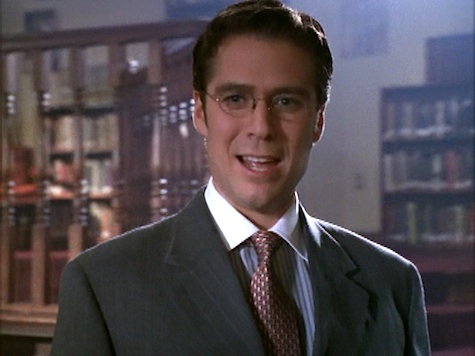
Clearly the Watchers’ Council’s sekrit agenda here is to ensure that Buffy entirely gets over Giles giving her power-sapping poison (such an inappropriate birthday present!) and to drive both Slayers into open rebellion against them. Wesley is custom built for the job. Buffy gently mocks him; Faith takes one look and walks away. In the process, we learn that Wes is seriously a prat and Balthazar, the demon of the week, might or might not be dead and either way totally wants his old amulet.
As they pursue the amulet, Faith keeps attempting to lure Buffy to the fun side. They start small: a little ill-advised but unrestrained fighting here, a bit of sexy dancing in the Bronze there. Then Faith ups the ante to stealing weapons and escaping police custody. That’s enough to freak Buffy out a bit, but things are all still basically fun and games up to the point where Faith, in the heat of battle, fatally stabs Deputy Mayor Allan Finch.
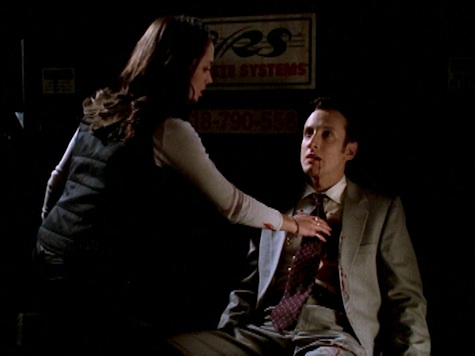
The two flee in opposite directions. Buffy runs into Angel, who is brimming with the joyous news that Balthazar and his minions have grabbed Wesley. Alas, they’ve also got Giles, and all because they still want their damned amulet. Battle ensues, the forces of good win, and Balthazar signs off with a veiled reference to the Mayor’s ascension.
I love “Bad Girls” but I can’t be entirely easy with it, because a big part of the episode is about physicality and, frankly, the messages are a little muddled. It’s not just that Faith likes killing monsters—she just plain gets off on being super-fit, super-strong, and built to kill. Her “did you do Xander?” interrogation of Buffy holds little significant difference, from her perspective, than her criticism of Buffy’s too-thinky fighting style. She’s encouraging Big Sis to abandon higher thought, embrace sex, and revel in reacting instinctively in combat.
Acting on instinct, though, is how she finds deputy mayor shish kebab on her hands.
It is also how the show ends up with one of its few demons of the week whose nature and depiction is fundamentally offensive: Balthazar is portrayed as fat, indolent, grotesque, and largely ineffectual. It’s hard not to see a thread of serious body hatred underlying this episode.
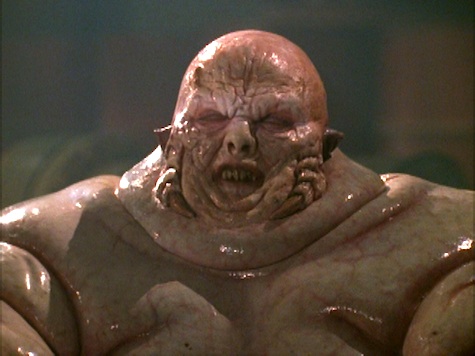
BtVS, I find, mostly gets things right, and it makes me loathe to pick on those elements of the show that do bother me. We all talked a little about the lack of representation for people of color on the show (this was around when Mister Trick turned up—and note that he’s getting the pointy end of the stake in the second half of this essay!) I am so very fond of the series that complaining about how the show’s core cast is mostly white, thin, and more or less middle class feels ungenerous. As many of you pointed out, Xander’s poor, we have a Jewish gay Willow and there are lots of Potentials of color in S7.
But still, it’s a skinny girl show. The way Balthazar’s depicted (paired, too, with Joyce’s odd bout of neurotic dieting babble) strikes an odd and off-putting note. And the argument between the idea of embracing your physical power and of letting your mind and inhibitions prevail goes unaddressed. Faith is a physical being, and promiscuous—she kills someone… and ultimately justifies it all by saying she’s built to kill. She’s got the power, so she’s allowed. Naturally, she gets punished for this. But does that mean that Buffy’s constant denial of her nature and her desires is entirely healthy or right?
Whew! Okay, that’s off my chest. While I am being ungenerous, I’ll also just throw in a complaint I haven’t fit in earlier, also about bodies—it’s about how easily and often the BtVS screenwriters toss around the word “lame.”)
Back on point. The Mayor’s embracing the physicality of being invulnerable for a hundred days—who wouldn’t? He’s easing into the S3 end game and this blog post has circled back round to the subject of death. Specifically, wet, watery death. In “Bad Girls,” Balthazar dies in his hot tub and the Balthazar acolytes, even though they’re armed with swords, make a good-faith attempt to drown Buffy. At the end of the episode, Faith has weighted and dumped Finch’s body in the river. (What river? Sunnydale has a river? Anyway, that’s what she says.)
Finally, guess who’s Lady-MacBething her clothes in the sink when Buffy shows up to debrief over the Deputy Mayor killing?
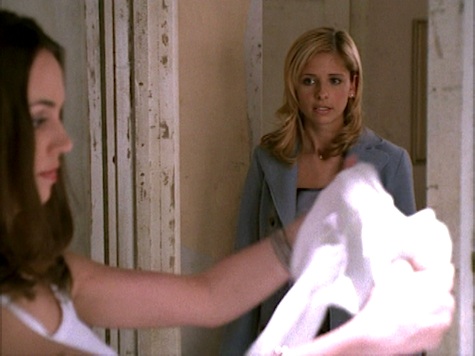
Water water everywhere. Small surprise that “Consequences” opens with a Buffy dream about Finch and Faith trying to drown her. You thought your work-related anxiety dreams were bad?
For once, it’s not a prophetic dream. Buffy’s just plain racked with guilt. She wants to tell Giles what’s happened, and Faith’s all, “No!” Wesley, meanwhile, has taken it into his head to oblige the girls to investigate Finch’s murder.
I haven’t rewatched the rest of the season yet, but it seems to me this is the first of several incidences of Wesley having a not-very-bright idea that rebounds in favor of Team Slayer. He may be a coward, but maybe he’s got a high luck roll?
Faith is all for hiding her crime, and agrees to having a poke through Finch’s office. As a result, she and Buffy see Wilkins and Trick together. It’s an important discovery, but it doesn’t rate as high as the cops finding Finch’s body and dropping by to check their Slayer alibis.
I don’t usually feel all that much sympathy for fictional characters who are throwing gas on their own infernos of self-destruction, but Eliza Dushku as Faith has me every step of the way in this episode. The gulf between that girl who’s scrubbing the blood out of her clothes in the crappy hotel and the polished way she pretends to be okay with it all is vast and sad. Dushku might have been born to play this particular lost girl as she swan-dives to her doom.
Hiding a murder must be tiring, because “Consequences” runs through an exhausting series of plot twists over the course of its forty-plus minutes. Faith gets questioned by the cops and then, feeling cornered, tells Giles it was Buffy who did the deed. She sexually assaults and throttles Xander when he tries to help, which I think we can all agree is even less funny than the syphilis.
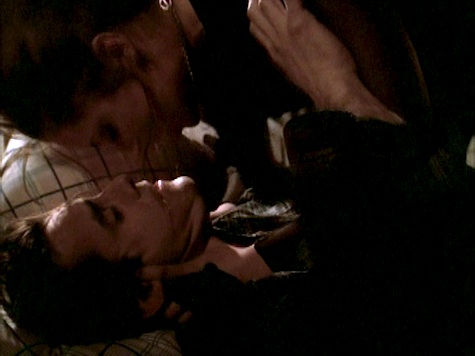
From there she gets beaned by Angel, leaving some of us to wonder when did she invite him in and what had she just killed that day? Then she’s subjected to the souled and sensitive vampire concept of rehab before the Watchers show up and threaten to bag her off to England for some bureaucratic procedure that can’t possibly be good.
And that’s just Faith. There’s so much to talk about in these two episodes: there’s Willow’s little bout of jealousy over the Slayers’ bonding, and the reconciliation with Buffy. Plus the nifty foreshadowing when she says, “Sometimes I unleash! I don’t know my own strength!” There’s all the interesting stuff we could delve into about Faith’s attack on Xander. There’s Trick’s death, the fact that Faith can’t quite leave Buffy to die despite everything, and the way Wesley’s every move makes Giles seem awesome like a rock star.
Wesley grows in Angel—there’s no denying it—but in caging Faith he’s just kicking her when she’s down. It’s a last straw. He’s reacting instinctively, and he drives Faith to truly desperate measures. She cooly evaluates her situation. She arrives at a brilliant tactic for both cleaning up the murder investigation and protecting herself from her alleged allies, who have time and again proven themselves untrustworthy.
She switches sides, in other words.
Like Faith, the Mayor has gotten remarkably little airtime until now. He’s really only been visible in tiny gemlike moments of funny. We’ve gotten enough to understand he’s evil, and adorable, and up to something. But it’s only when Faith joins his campaign that the two really step into the spotlight this season. The reason is simple: without each other, they’re incomplete.
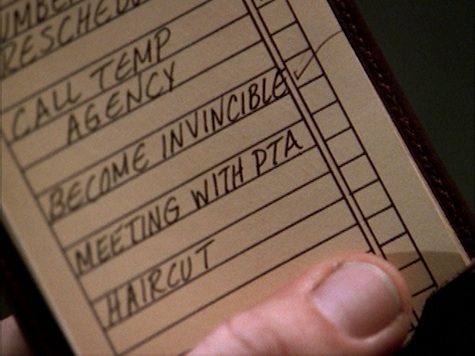
But now they’ve teamed up, you can almost hear thrum of this season’s engine, notching up to the next gear.
Next: Everyone loves an evil twin
A.M. Dellamonica has two short stories up here on Tor.com. First up: an urban fantasy about a baby werewolf, “The Cage” which made the Locus Recommended Reading List for 2010. Her second story here is called “Among the Silvering Herd.” In October, watch for a novelette, “Wild Things,” that ties into the world of her award winning novel Indigo Springs and its sequel, Blue Magic.










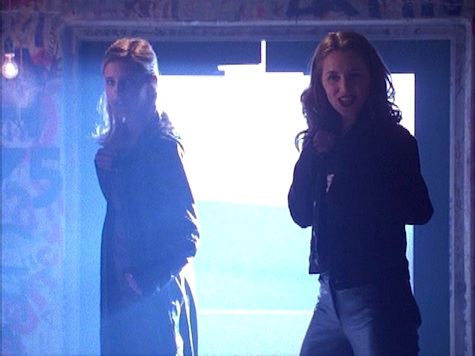
Wesley has always been my favorite character in the Buffy-verse, hands down. I think they did a really good job of developing him over six years from the prat he is here to the pretty dark anti-hero he is by the time he dies.
Even here, though, I never saw Wes as a villain, just someone in way over his head. I can’t remember if these are the first words we heard from him or just very close, but I think they sum him up perfectly:
Wes: I myself have faced two vampires, under controlled circumstances of course.
Giles: You won’t find any of those in Sunnydale.
Wes: Vampires?
Giles: Controlled circumstances.
That’s his issue. He’s not by any means stupid, and he often shows some good insticts, but he’s playing by rules that everyone else has tossed out the window, and he looks pretty bad when he’s playing the wrong game.
Nicely put, Lsana. I agree. And I’m glad he got a chance to be on Angel, and to thereby grow from a Plot Obstacle into a real person.
I for one have never found any council decision to be anything but harmful. They deserved their fate!
With Balthazar, it seemed that perhaps somebody had read that 1984 big fantasy novel, Maia, by Richard Adams, which features in the section titled “Slave Girl,” the montrously enormous High Counsellor Sencho, spymaster of the Beklan Empire, who buys the eponymous protagonist and her, ah-hem, ‘dark sister,’ who minister to his every most intimate need, as well as spy. Sencho was much more intelligent than Balthazar though.
You’re not making Maia sound like a novel I want to read. But smarter would be a start.
Thanks for addressing the fat hatred in this episode. It definitely struck an off note and I think it’s important to critique the things we love and be aware of when that kind of shitty stuff creeps in. Also an interesting point how it is paired with the Buffy/Faith dichotomy — definitely some stuff that seems like it verges into territory I wouldn’t expect from Whedon and crew. I also wish that Faith’s sexual assault of Xander had been treated a little more seriously… It seems like a largely accidental killing of a stranger is treated as Faith’s “real” crime and her assault of Xander is just kind of ignored. And then in subsequent seasons, there are all sorts of issues when Angel and then Spike start hanging with the Scoobies because of what they had done to various members of the Scoobies (especially Giles) in the past, but in S7 when Faith comes back there’s not a whisper of hey, maybe this could be uncomfortable and traumatic for Xander to have her back among them, instead it’s all about Buffy’s conflicts with her. Nonetheless, problematic areas aside, these episodes are leading up to some of my favourite arcs — Faith and the Mayor are so. damned. perfect.
If you follow him into ANGEL, Wesley must have had one of the most interesting character arcs on either show, from well-intentioned but self-important bumbling fool (which he still was when he arrived on ANGEL) to the grim, dangerous, ruthless, and hyper-competent figure he ended up as–pretty much what he liked to think of himself as but was not when he arrived in Sunnydale for the first time. The actor should be complemented for managing to be convincing as the character over such a wide spectrum, rivaled in the shows only by Spike’s arc.
If you needed any more evidence, though, that the Watcher’s Council are fools themselves, you need look no further than them assigning someone like Young Wesley to be in charge of their prime, front-line slayers, the thin line between the survival of the world and the opening of the Hellmouth and global Apocalypse. You’d have to be pretty dumb to look at Wesley and entertain for a moment the idea that he’d be up to the responsibility, particularly as inexperienced as he is. Combined with their “birthday present” to Buffy from several episodes back, you’re left with no other conclusion than that the Watcher’s Council is deeply incompetent.
As far as Faith killing a human is concerned, we covered some of this ground some time back, when discussing another episode. It’s possible that Buffy is reacting too extremly here, particularly as she wasn’t the one to kill him. Even if she had been, as Giles points out, they’re at war with immensely dangerous creatures who want to conquer or destroy the whole world, or who at the very least are bent on killing as many innocent people as possible, and mistakes happen in the heat of combat when you’re fighting a war. It’s unfortunate, but that’s the reality of the situation. (Plus, Deputy Mayor Allan Finch is no innocent–when killed, he’s in the midst of leading a raiding party of vampires who are attacking Buffy and Faith and trying to kill them. He put himself in harm’s way.)
Balthazar is a minor, throw-away villain, just there to give them somebody to fight–he’s probably a humanoid version of Jabba the Hut. Really fat characters in TV and movies tend to be either villains, like the Baron from DUNE, or supersmart, like Mycroft Holmes and Nero Wolfe.
Yes, he is very Jabba the Hut-ty, I agree.
I didn’t think Allan Finch was helping with the raid. The Mayor didn’t know what he was doing there. But I’m prepared to be proved incorrect on that front. I am, as it happens, often wrong.
Mycroft Holmes, Nero Wolfe, and Fitz from Cracker. Heart!
First, I could have done without Wesley in both series. He was annoying in Buffy and sanctimonious in Angel. Too bad the guy in Angel was such a druggie that I bet that was the reason they killed him off early.
As for skinny girls, sorry but that is the way it is…you are not going to see shows with that represent the regular population. Few people are going to watch shows with average looking people, not counting comedies, which is a special skill set. Guys might be able to get away with it, girls never.
As for the episodes, they were both good and featured a lot of good things, with Eliza being remarkably good as Faith. The thing that made her performance so good was the little subtleties you could see when she was not being over the top.
The situation with the assualt on Xander not being taken seriously is kind of a pattern on the show. Bad things that happen to male characters (even one-shot victim characters) count for less. Since Western audiences react more to victimized females I can see why the writers went that way, but it still rankles.
Personally I think Wesley’s assignment (one barely trained Watcher to two slayers) was part of an ongoing attempt by the Council to get Buffy and Faith killed without causing dissension in their own ranks. See also the particular choice of vampire for Buffy’s test. Considering that the pair of Slayers were resistant to orders, had lied to the organization (Angel is in Hell really, my Watcher is on a trip), and had individually gone off the grid for extended periods it isn’t hard to see why an institution based on hierarchy and obedience would want anyone else to be their primary field agent. Not a moral or ethical thing for the Council to attempt, but somewhat understandable.
Also it seems worth pointing out the Wesley didn’t get ruthless in Angel. He was always ruthless and we’ll see that in a few episodes. The important part is that he is ruthless (if not always competent) in the pursuit of the greatest good for the largest number of people (except one episode where he went for vengence). This naturally is a cause of conflict in a television show where the primary cast are the most important people in the world because the stories (and the audience) revolve around them.
the Watcher’s Council is deeply incompetent.
I figured they’d been compromised by the bad guys.
As to the use of “lame”, it was a fairly common slang usage amongst 20-somethigns I knew at the time.
There really seem to be only two possibilities about the Watcher’s Council: either they’re deeply incompetent and stupidly hide-bound by useless tradition, or, as Tarbis suggests, they’re deliberately trying to get Buffy killed (which is amazingly short-sighted of them, but politics frequently do make people do stupidly short-sighted things that are actually against their own best interests). I suppose they could have been compromised by the bad guys, although that seems less likely to me than the other two possibilities.
It’s interesting that very fat men (and it’s almost always men) are often portrayed in genre fiction of various kinds (not so much in mainstream fiction) as being super-intelligent; there’s many more examples other than just Mycroft and Nero Wolfe. I wonder if this can be traced back thousands of years to the attitude of St. Augustine and other early church leaders that mind/spirit are what’s important, and mere physicality is not important, is, in fact, something that holds the spirit back. It’s easier to figure out what’s going on with fat men who are Evil, like the Baron from DUNE–they’re symbols of decadence and indulgance run riot. Explaining why fat men who are NOT evil are so often portrayed as super-intelligent is more intriguing.
It may be an interesting indication of changing prejudices and values that Mycroft Holmes from the British SHERLOCK is NOT portrayed as being fat. Is this because they felt that it would be un-PC to have him be fat, or that they felt that the audience would react negatively to him if he was? Along the same lines, Sherlock Holmes is no longer a cocaine addict in that show. Were they afraid that modern audiences were too PC to be able to sympathize with a cocaine addict as the hero?
The problem I had with this episode was that the fat demon was incompetant. As we know from literature and real life, we fat people (or as we prefer to call ourselves “normal people surrounded by anorectics”) gravitate to the upper echelons by virtue of our superior brains (see “Waldo” by RA Heinlein as an excellent example). The pudgy demon herein porrayed was a buffoon and not deserving of the term “fat.” This insidious stereotype, of a fat person who is less than perfectly competent, is offensive and those who scan for “representation” should rightly be offended by this characterization…
@Gardner Dozois – Completely agree on the Wesley front. His story doesn’t really take off until Angel, and even then, it takes its time. Like Spike, I get the feeling that his arc wasn’t planned for at all, and yet he performs beautifully when you wouldn’t necessarily expect him to. There’s no way to know in this initial episode of Buffy just what the character — and the actor — are capable of. Even when they brought him onto Angel, it was right as Glenn Quinn was leaving (R.I.P.), and I can remember being a little annoyed because Wesley felt like a weak replacement for Doyle, who I’d really come to like. But I grew to admire, pity and root for Wesley as Angel wore on.
In these early episodes, though, I didn’t like him much; he’s doing everything wrong. He’s the catalyst for Faith’s 180, and once she’s driven a stake into the Deputy Mayor’s heart, there’s no going back. It’s not just the act, it’s the behavior that follows — it seems callous to say she handles it ‘unprofessionally’, but Giles is right, human casualties are a regrettable possibility when you’re a Slayer. Ironically, she uses her role to justify the death, but doesn’t treat it like a Slayer should. And that’s what ends up driving a wedge between her and everyone else.
My favorite part about the Buffy/Faith dichotomy is exploring this idea of just what being a Slayer means. The word itself, ‘slay’ is pretty clear — to kill, to end. And in the Buffyverse, ‘slay’ is always coupled with the unspoken word ‘evil’. Sounds simple in theory, and yet, the world is filled with people who’ve done or are capable of evil deeds. In some respects, ‘evil’ people are worse — a vampire doesn’t have a soul, but a human being does.
Buffy has it more or less right — a Slayer is only meant to kill inherently evil creatures (but even then, on a case by case basis… that’s another interesting aspect of the show). Humans have their own system of crime and punishment. Buffy points this out to Faith, but in Faith’s mind, their powers make them superior, and I love how clearly opposed they are in this — Buffy enforces the law; Faith is the law. It’s a lesson in this idea of absolute power corrupting absolutely, that it needs to be tempered with wisdom and compassion.
It also goes to show that Slayer power does not a Slayer make, at least, not one that can be relied upon. Not a perfect system, is it? And the Watchers might have once been competent guardians, but in their old age they’ve let their egos get in the way of seeing things clearly (a metaphor, perhaps, for how humanity can stagnate when clinging to an outmoded paradigm?). Nowadays, only Giles is truly left (among the Watchers) to hold the line, and he does so with dedication and poise, whether or not he’s employed.
I love love love the Mayor, who’s so deliciously creepy in his own, charming way… but I was actually a little put off when Faith joins up with him. I may stand alone in this, but something about this particular part of her arc didn’t gel with me. I don’t disagree that the groundwork was laid for her emerging instability, or that the plot twist wasn’t an interesting choice (Joss love his anti-heros), and I don’t even think Eliza Dushku is a bad actress… I just remember not really enjoying ‘evil’ Faith, at least, at this point. I remember it all feeling a little heavy handed, particularly when she gets to torturing Angel. I didn’t really read her pain or fragility there; she was too flippant about all of it. Maybe that’s just how Faith copes, but I had trouble believing her at times, and kind of found her irritating at this point, honestly. But I don’t think this was purely Eliza Dushku’s fault; I think it was a combination of factors.
However, I will say I liked her daddy-issue riddled relationship with the Mayor as things progressed, and the fact that Angel chose to reach out to her. I also really loved how he stood up for her on Angel when Buffy ends up in L.A. hot on her trail. I liked Faith’s stuff on Angel more, overall… I think it was important for her to show up at the end of Buffy, but I agree that her reintegration felt a little sudden and a lot of her past crimes were brushed over. I guess everyone in the Buffyverse gets a ‘get out of jail free card’, though (In Faith’s case, quite literally), when it comes to going off the deep end and then trying to make ammends.
I don’t think they had any choice but to replace Doyle. Would be interesting to see what the show would have been like if they’d kept him and not replaced him with Wesley. Hard to evaluate something that never happened, but my gut feeling is that Wesley’s character arc was more interesting over the life of the series than Doyle’s probably would have been.
Ooh! So many things to respond to!
Wesley got an unexpected chance to shine when Doyle had to go, and I think the character (and Alexis Denisof) came off rather well. I didn’t think it would come together half as well as it did.
I am a sucker for bad people turning out not-so-badly, so Faith’s redemption, in the longer BtVS arc, really worked for me.
Thanatos: noted.
Gardner–I’m looking forward to the U.S. Sherlock, Elementary, where he’s in recovery and Lucy Liu is his sober buddy. And yeah, lame was (and still is) standard usage, but it grates on me now. A lot.
Tarbis and everyone who commented on the assault on Xander getting glanced past–okay, yes. Obviously, this should get more play than it does. But there’s a delicate balancing act going on, writer-wise, where Xander’s concern. His role in the show is one traditionally occupied by a woman. Vastly oversimplified: he’s the weak one and he’s the moral center. He’s ‘the heart,’ right. But he’s not a woman, he’s a guy. And making too much of things like Faith ripping his clothes off and pelvic grinding him… well, I can see an argument whereby some would say, “Hey, you’re emasculating a perfectly good guy here!”
(Feel free to disagree, of course.)
That said, tarbis, I like your theory that the Watcher’s council was actively, if ineptly, trying to kill Buffy and Faith and get themselves another obedient, Kendra-like mayfly.
John, that is the way it is, you’re right. But this skinny white female feels obliged to kvetch about it sometimes.
Gardner
American audiences accepted Dr. House’s vicoden addiction reasonably well. I think the fact that cocaine was legal in Holmes’ time but isn’t now makes the difference.
Regarding Balthazar: I did like one of his lines “A trade. Intriguing. No. Wait. Boring.”
Regarding the assistant mayor: In season 5 when Buffy meets Parker, he tells her that his father recently died; when that happened, I half expected him to be the assistant mayor’s son, but it was not to be.
Andy–It would have been so cool if that had come together, with Parker!
And yeah–the No. Wait. Boring line was great.
When you said there was so much to talk about, I kind of thought you were going to talk about it, beyond just mentioning what happened. Also Faith was staying in a motel, so technically no one lives in that building, and the rules for entry to anywhere that’s not a personal residence are left sketchy and loose (I think the most we ever get is when Jenny Calendar asks how Angelus got into the school and he mentions the inscription over the door).
I think one thing about the Buffy/Faith contrast here is quite simple and straightforward: people -need- inhibitions and impulse control. The more powerful you are, the more you need.
Imagine a 3-year-old with an adult’s physical and mental capacities. Or for that matter, imagine a house-cat the size of a cougar; I doubt we’d let them sleep on our beds.
One of the interesting things forensic archaeology has determined is that death by violence becomes much less common in the process of historical development.
There’s a massive drop when the ‘state’ level of society emerges, and then another one in modern times.
(Which is why you were actually more likely to be killed by other human beings if you were born in an uncontacted New Guinea highland village in 1900 than if you were born in Germany or Russia in that year.)
The ‘natural’ or default state for human beings is one where violence is the largest single cause of death for adult males, and a substantial risk for females; the evidence from the bones puts it at a minimum of 30%/10% respectively, almost certainly an underestimate. This is similar to other social predators and not much different from chimps.
The accumulation of inhibition (personal and institutional) over time is what changed this to the situation in the contemporary West where death by violence is a rather shocking rarity.
You can see the process at work in innumerable ways; frex, there’s a manners manual from the early Renaissance I’ve read which makes a number of points about how a ‘gentleman’ should act. Among the things he shouldn’t do are scream and wave his fists when angry; also no pouting, no going and standing with his face in a corner… Sound familiar?
The problem with being in touch with your feelings is that you often feel like beating people up, or robbing them, or things of that nature.
Hey, General–
We can talk about any and all of it–I like to leave room for commenters to seize on what’s most interesting to them.
Steve–good points… and you back them up with such cool data!
re: Angel getting in to Faith’s without an invite, she lives in a motel, and doesn’t really make much of a home out of her room. I don’t think he needed an invite to get in, any more than he does to get in a hotel room or a public building.
Good point, Mels. I would have thought a hotel room, if it was yours, might be vamp-proof. But I can see the argument that it wouldn’t, especially considering how Faith isn’t homey.
AMDellamonica@7, it is fairly clear that Allan Finch was in that alley not because he was leading a bunch of vamps but because he was where the vamps were because he knew the Slayers would be there, because he wanted to blow the whistle on the Mayor. It is clear from the start that Finch is extremely uneasy with the Mayor’s darker side, and the Mayor himself both comments that he doesn’t know what Finch was doing there and that it was strange that Finch had kept so much incriminating documentation rather than shredding it.
The conclusion is obvious, and, of course, makes Faith’s accidental killing so much more tragic (and, for the Mayor, lucky, though he never knows it).
I find that there’s always a little wiggle room in the obvious conclusions, Null. You’re right, of course, but the question was never answered so completely that they couldn’t have changed things up in a later episode.